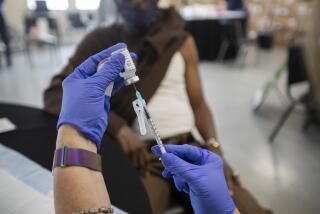Study Finds Reading Problems Hinder Health Care
- Share via
Calling poor reading ability a “silent disability” that possibly endangers lives, the first major survey of hospital patients’ literacy shows that nearly two-thirds of Spanish-speaking patients and one-third of English-speaking patients can’t make sense of medical forms, prescription drug labels and various doctors’ orders.
The survey of more than 2,600 public hospital patients, including nearly 1,400 from Harbor-UCLA Medical Center near Torrance, has implications for Los Angeles County’s public health system.
The new research suggests that for many patients, the written word may be a significant barrier in the sprawling and often-daunting health care system.
Dr. William Loos, medical director of the Los Angeles County Department of Health Services, said the survey indicates there is “room for improvement” in the way doctors and nurses communicate with patients. They “need to do a better job of listening to patients and perhaps ask probing questions to test their understanding,” he said.
“Everybody who takes care of patients needs to be aware that this is a potential problem,” said Dr. Wendy Coates, an emergency physician at Harbor-UCLA who participated in the study, which was published in today’s Journal of the American Medical Assn.
In the study, 2,659 patients visiting emergency rooms at Harbor-UCLA and an Atlanta hospital completed a 50-item questionnaire. The test, offered in English or Spanish, presented information that patients commonly encounter, from medical research consent forms to follow-up clinic appointments to medication instructions.
Overall, 35% of English-speaking patients and 62% of Spanish-speaking patients scored in the “inadequate” or “marginal” literacy ranges.
The study’s lead researcher, Dr. Mark Williams of Emory University in Atlanta, said elderly patients, whose ailments demand the highest levels of explanation, scored the lowest of all age groups. Among Los Angeles patients older than 60, 48% of English speakers and 71% of Spanish speakers were rated medically illiterate.
The findings dovetail with other literacy studies. A 1993 U.S. Department of Education study found that roughly half of adults lacked the reading skills to function fully in society.
The medical researchers propose several steps to overcome the reading barrier. Doctors could give patients audio and videotapes--or perhaps have them watch computer presentations explaining their illnesses and therapies.
Loos, of the county health department, said the study shows the interdependence of social services: “Children need to be healthy in order to learn, and they need to learn in order to be healthy.”
Harbor-UCLA’s Coates made a suggestion for clearing up the often muddled doctor-patient relationship. While taking a patient’s history of conducting a physical exam, doctors should ask a simple question: “Can you read?”






